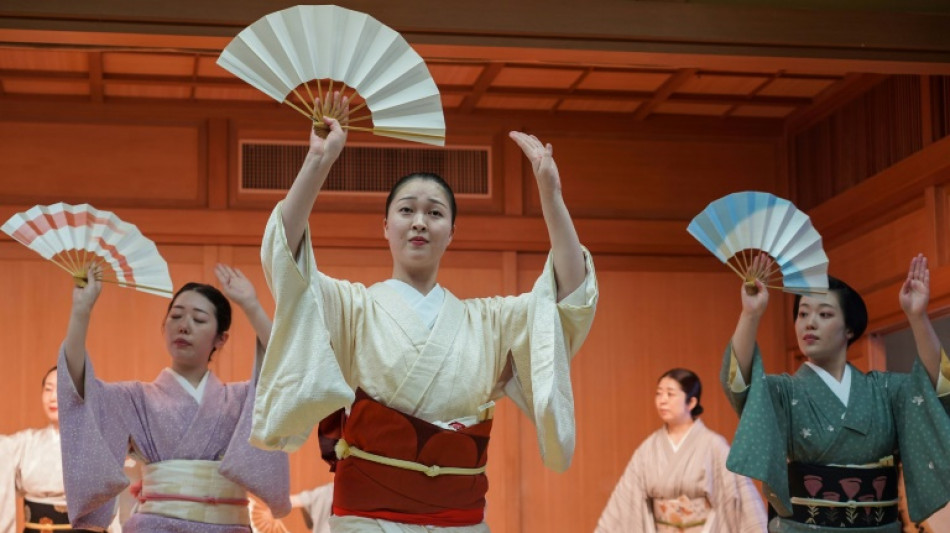
-
 UK royal finances in spotlight after Andrew's downfall
UK royal finances in spotlight after Andrew's downfall
-
Diplomatic shift and elections see Armenia battle Russian disinformation

-
 Undercover probe finds Australian pubs short-pouring beer
Undercover probe finds Australian pubs short-pouring beer
-
Epstein fallout triggers resignations, probes

-
 The banking fraud scandal rattling Brazil's elite
The banking fraud scandal rattling Brazil's elite
-
Party or politics? All eyes on Bad Bunny at Super Bowl

-
 Man City confront Anfield hoodoo as Arsenal eye Premier League crown
Man City confront Anfield hoodoo as Arsenal eye Premier League crown
-
Patriots seek Super Bowl history in Seahawks showdown

-
 Gotterup leads Phoenix Open as Scheffler struggles
Gotterup leads Phoenix Open as Scheffler struggles
-
In show of support, Canada, France open consulates in Greenland

-
 'Save the Post': Hundreds protest cuts at famed US newspaper
'Save the Post': Hundreds protest cuts at famed US newspaper
-
New Zealand deputy PM defends claims colonisation good for Maori

-
 Amazon shares plunge as AI costs climb
Amazon shares plunge as AI costs climb
-
Galthie lauds France's remarkable attacking display against Ireland

-
 Argentina govt launches account to debunk 'lies' about Milei
Argentina govt launches account to debunk 'lies' about Milei
-
Australia drug kingpin walks free after police informant scandal

-
 Dupont wants more after France sparkle and then wobble against Ireland
Dupont wants more after France sparkle and then wobble against Ireland
-
Cuba says willing to talk to US, 'without pressure'

-
 NFL names 49ers to face Rams in Aussie regular-season debut
NFL names 49ers to face Rams in Aussie regular-season debut
-
Bielle-Biarrey sparkles as rampant France beat Ireland in Six Nations

-
 Flame arrives in Milan for Winter Olympics ceremony
Flame arrives in Milan for Winter Olympics ceremony
-
Olympic big air champion Su survives scare

-
 89 kidnapped Nigerian Christians released
89 kidnapped Nigerian Christians released
-
Cuba willing to talk to US, 'without pressure'

-
 Famine spreading in Sudan's Darfur, UN-backed experts warn
Famine spreading in Sudan's Darfur, UN-backed experts warn
-
2026 Winter Olympics flame arrives in Milan

-
 Congo-Brazzaville's veteran president declares re-election run
Congo-Brazzaville's veteran president declares re-election run
-
Olympic snowboard star Chloe Kim proud to represent 'diverse' USA

-
 Iran filmmaker Panahi fears Iranians' interests will be 'sacrificed' in US talks
Iran filmmaker Panahi fears Iranians' interests will be 'sacrificed' in US talks
-
Leicester at risk of relegation after six-point deduction

-
 Deadly storm sparks floods in Spain, raises calls to postpone Portugal vote
Deadly storm sparks floods in Spain, raises calls to postpone Portugal vote
-
Trump urges new nuclear treaty after Russia agreement ends

-
 'Burned in their houses': Nigerians recount horror of massacre
'Burned in their houses': Nigerians recount horror of massacre
-
Carney scraps Canada EV sales mandate, affirms auto sector's future is electric

-
 Emotional reunions, dashed hopes as Ukraine soldiers released
Emotional reunions, dashed hopes as Ukraine soldiers released
-
Bad Bunny promises to bring Puerto Rican culture to Super Bowl

-
 Venezuela amnesty bill excludes gross rights abuses under Chavez, Maduro
Venezuela amnesty bill excludes gross rights abuses under Chavez, Maduro
-
Lower pollution during Covid boosted methane: study

-
 Doping chiefs vow to look into Olympic ski jumping 'penis injection' claims
Doping chiefs vow to look into Olympic ski jumping 'penis injection' claims
-
England's Feyi-Waboso in injury scare ahead of Six Nations opener

-
 EU defends Spain after Telegram founder criticism
EU defends Spain after Telegram founder criticism
-
Novo Nordisk vows legal action to protect Wegovy pill

-
 Swiss rivalry is fun -- until Games start, says Odermatt
Swiss rivalry is fun -- until Games start, says Odermatt
-
Canadian snowboarder McMorris eyes slopestyle after crash at Olympics

-
 Deadly storm sparks floods in Spain, disrupts Portugal vote
Deadly storm sparks floods in Spain, disrupts Portugal vote
-
Ukrainian flag bearer proud to show his country is still standing

-
 Carney scraps Canada EV sales mandate
Carney scraps Canada EV sales mandate
-
Morocco says evacuated 140,000 people due to severe weather

-
 Spurs boss Frank says Romero outburst 'dealt with internally'
Spurs boss Frank says Romero outburst 'dealt with internally'
-
Giannis suitors make deals as NBA trade deadline nears


Century-old Tokyo geisha festival revives dying art
The geishas glide with measured steps across a wooden stage, offering a glimpse of a long-misunderstood tradition that is becoming a rare sight in Japan.
Dancing with paper fans and dressed in kimonos, the entertainers were rehearsing without the striking white make-up and sculpted hairstyles they are famous for.
But for seven days from Wednesday the women will perform in full splendour at the 100-year-old Azuma Odori festival at a theatre in the heart of the Japanese capital.
In the popular imagination geishas are often confused with courtesans, but in fact their work -- as trained masters of refined old artforms -- does not involve selling sex.
"Japanese people themselves often don't understand or have the wrong idea about what geishas do," Hisafumi Iwashita, a writer specialised in geisha culture, told AFP.
In Japanese, the word geisha means "person of the arts" — a woman or man trained in traditional Japanese performing arts. But the core role of geishas goes far beyond "just dancing and singing," Iwashita said.
Geishas in different parts of Japan are also known for different skills.
In Kyoto, where they are called geikos, "dance is seen as the most important artform," Iwashita said.
Tokyo geishas meanwhile are known for their singing and talents on the shamisen, which resembles a slim three-stringed guitar.
This year for the first time ever, geishas from 19 Japanese regions are participating in the annual Azuma Odori, as well as those from Tokyo's Shinbashi district who usually perform.
Around 180 geishas will take part overall, taking to the stage in small groups for two shows each day.
Koiku, a Shinbashi geisha, said her job first and foremost involves "welcoming and entertaining visitors at traditional restaurants called ryotei".
Entry to these expensive, exclusive establishments, found in historic geisha districts known as hanamachi, is by invitation only.
- 10 year's training -
Today around 40 geishas work in Shinbashi -- many fewer than in times gone by -- and all of them will appear at the Azuma Odori.
"Not so long ago, there were 100 of us, then 60... and the number keeps going down," Koiku said.
Life as a geisha is tough, with a strict practice schedule even for established performers.
"In general, it takes 10 years to be seen as competent," said Koiku, who was enticed by her love of music and dance.
The geishas' choreography, watched by their instructors and accompanied by live musicians at the rehearsal, includes playful touches such as miming the movements of a fox.
It is not polite to ask a geisha's age, but some taking part in the show have been performing for five or six decades.
Koiku said she is worried that if nothing changes, it will be "too late" for the waning geisha tradition.
Azuma Odori's roots date back to Japan's 1868-1912 Meiji era, when dance began to take a more central role in geisha performances.
Geishas, who would entertain government officials at banquets, played "a key role" in shaping modern Japanese culture, according to the expert Iwashita.
He thinks the main reason for the falling number of geishas in Japan is simply that they have fewer clients.
While geishas once made a living from Japan's wealthy elite, in 1993 then-prime minister Morihiro Hosokawa called for an end to government banquets in ryotei restaurants.
That was a "tough blow for the industry", Iwashita said.
Koiku agrees that the "world has changed" -- including the type of socialising where business deals are sought.
"Nowadays, companies are increasingly organising receptions in their offices or other venues," she said.
Shinbashi Enbujo Theatre, where Azuma Odori will take place, was inaugurated in 1925 with the festival's first edition.
It was rebuilt in 1948 after being destroyed in World War II, and its lavish post-war performances influenced Japanese kabuki theatre before being simplified to audience tastes.
With the future of the geisha profession uncertain, for Iwashita, "the fact that such a theatre still exists, and that it is the 100th anniversary (of Azuma Odori) is nothing short of a miracle".
D.Qudsi--SF-PST

